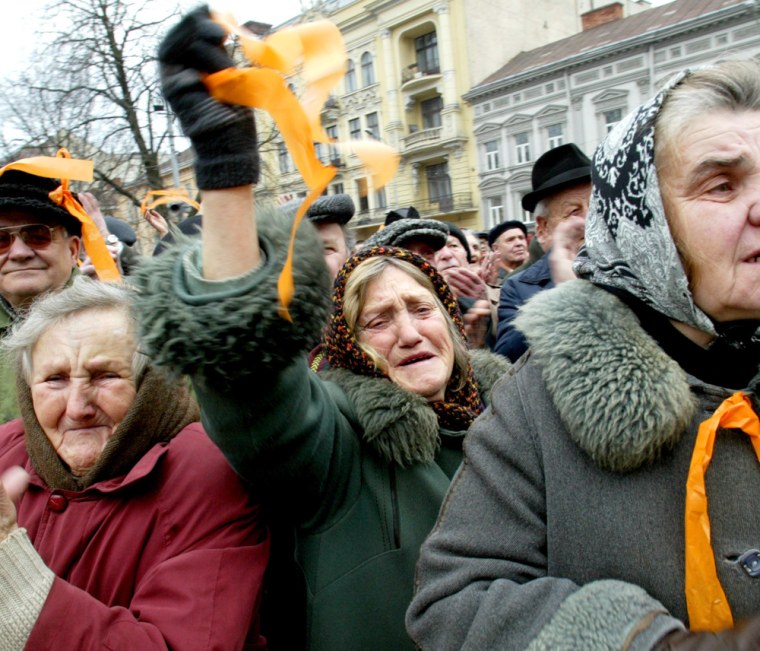“The day before the election the law says there is no propaganda allowed. So we’re taking the day off,” explained Oleksiy Prokopyev, 25.
But he was still spending his ‘day off’ at the office. In a revolution, there is work every day.
Prokopyev and nine fellow journalists left their stable jobs at pro-establishment newspapers to help Ukraine’s Orange Revolution.
Their startup publication – appropriately called “Revolutsya" — is a two-page bulletin that delivered news on the democratic movement in Ukraine that helped spur the Supreme Court to call for a re-vote of the orginally fraud-ridden vote held on Nov. 21. Preliminary results from the re-run election held on Sunday show opposition candidate Viktor Yushchenko leading in the polls, with international election observers saying the election was much fairer than the previous vote.
Youth newspaper plays part
“Revolutsya” is just one example of the recent up swell in civic activism among the nearly 50 million Ukrainian people. Everyday citizens delivered home-cooked hot meals to demonstrators camped out in freezing temperatures, while world champion boxer Vitaly Klitschko competed with an orange ribbon, Yushchenko’s campaign color, tied to his boxing shorts.
“A lot of journalists couldn’t write what they wanted, before the revolution and during it. At “Revolutsya,” they can express themselves freely without censorship,” said Prokopyev. “The idea is to get information out to the people in the streets.”
“Writing for ‘Revolutsya’ has been a very emotional experience. I’ve breathed freedom,” said Maxim Serkov, 25, a co-founder of the paper. “I don’t want to go back to my old newspaper. That’s in the past. ‘Revolutsya’ is the future.”
The staff operates out of a donated hotel room on the top floor of the St. Petersberg Hotel with a view over Kiev rooftops onto the Statue of Independence, located at the end of the capital city’s main thoroughfare, Khreshchatyk Street.
The office has a bohemian look, littered with half-empty pizza boxes, Camel cigarette packs, a ‘Free Tibet’ flag, and a life-sized, tinsel-wrapped Yushchenko cardboard cutout. Five computers sit on a work table. Only one has an Internet connection.
Yaroslav Shapochka, 30, or “Shapka” to his workmates, is another co-founder of the paper. A former war correspondent with classic Slavic looks, he is demurely cool and an earnest idealist. After the disputed November 21 vote, he embraced the opportunity to help the revolution.
“We’ve waited since independence, 13 years, for this freedom to happen,” he said, referring to Ukraine's break-up of the Soviet Union in 1991. “Nothing may come out of this newspaper venture, but we hope it will. Ukrainian society over the past month has made a huge spiritual leap. We want to provide them with the truth.”
Information for demonstrators in tent cities
At the height of the Orange Revolution, the paper, published daily, provided information to the 3,000 people from around the country camped out in tent cities on Khreshchatyk Street and around parliament buildings.
Activists distributed the 25,000 copies of each edition for free; stacks were loaded onto trains bound for the eastern half of the country, to Kremlin-backed candidate Viktor Yanukovich’s base.
Staff writers, many of whom use pseudonyms, have not been paid since the first edition published on November 29.
“We just work out of enthusiasm,” said Prokopyev.
But hopefully that will change this week, when Ukrainian IT-guru Vasil Kutchenko plans to match each writer’s salary from their previous job.
After only a month, “Revolutsya” has a committed readership.
“Everyone here reads it,” said Aleksandr Klimoshevich, who has lived at the tent camp since November 23. “We sit here on Khreshchatyk with no TVs. ‘Revolutsya’ is how we get our news.”
“As soon as the news happens, that’s how we learn about it,” said Petro Syrzhuk, who wears a Yushchenko orange armband. “The topics are more about what’s going on in the tent cities, how the government’s decisions influence us here.”
Free press part of future of Ukraine
Will the appetite for “Revolutsya” continue after the Orange Revolution is over?
“Of course. We want it to keep publishing. And we especially want it to keep its name,” said Posmarenko, as his friend Vadim corresponded via walkie-talkie with a friend in a neighboring camp. “It played a vital role in certain strategic parts of the tent cities, the ones on the front lines by parliament. It helped us organize.”
In a speech last night at his campaign headquarters, Yushchenko thanked journalists for their drive to get the story right over the course of the drawn-out election.
“I’m sure that without free journalists and free press, the world wouldn’t see Ukraine as it is today,” he said.
